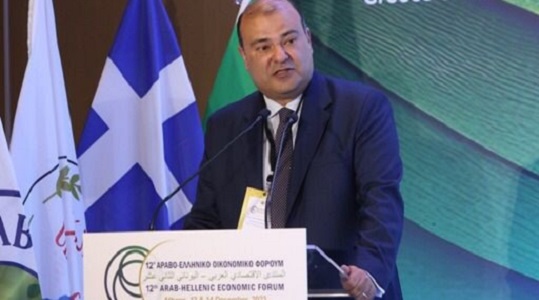The Secretary General of the Union of Arab Chambers, Dr. Khaled Hanafi, praised during the 12th Arab-Greek Economic Forum, which was hosted by the Greek capital, Athens, on 12-13-2023, in the presence of the Minister of Development of Greece, Kostas Skrekas, the Deputy Minister of Environment and Energy of Greece, Alexandra Sdoukou, the President of the Greek-Arab Chamber, Jeronicolas Harris, the Secretary-General of the Hellenic Arab Chamber, Rashad Mubjer, in addition to a crowd of Arab ambassadors accredited to Greece, and dignitaries Ministerial and Economic affairs from the Arab and Greek sides, In-depth of the historical relations between Greece and the Arab world, “as the two sides share many commonalities, values, and principles, foremost of which is respect for the sovereignty of states, non-interference in the internal affairs of others, and adherence to international law. Here Greece's honorable political and diplomatic position is evident, calling for an end to the war in Gaza and stopping the killing and destruction, and supporting the right of the Palestinians to establish their independent state. This was clearly announced by Greek Prime Minister Kyriakos Mitsotakis, during his speech at the Cairo Peace Summit held on 10/21/2023, by saying that the peace process related to the conflict between Israel and the Palestinians should continue based on a two-state solution, with the aim of ending this conflict.”
He stressed that "although the events and developments that the world is going through today are going through an exceptional phase full of challenges, no country in the world has been spared from their repercussions, the economic relations between Greece and the Arab countries have witnessed a remarkable development, even if it does not live up to the level of hopes and ambitions." Pointing out that "Greece is witnessing an economic recovery recently, as it achieved the highest growth in many years, exceeding 6 percent. This is a very important indicator that opens the door for business circles from both the Arab and Greek sides to exploit this constructive and positive economic transformation to work on reviving the economy." Arab-Greek economic relations and their development are not only at the level of raising the level of trade exchange volume (import and export), which of course does not exceed the limits of 7 billion dollars, and therefore does not live up to hopes and ambitions.”
The Secretary-General of the Union called for “the importance of strengthening the partnership between the Arab world and Greece from just a traditional, classical relationship based on import and export, to move it to a strategic partnership at all levels, and on the broadest practices of trade and sustainable development armed with the tools of digitization and the Fourth Industrial Revolution. This requires the private sector to take bold initiatives and explore the capabilities and resources of the other party, to reach new successful and sustainable partnerships in the sectors of the new economy, circular economy, information and communications technology, financial and banking technology, and logistics services. In addition, enhancing cooperation in the field of energy and renewable energy, and in exploring and transporting natural gas, represents factors that help stabilize the Eastern Mediterranean region. In addition, in light of the ambitious visions to enhance the contribution of innovation and the shift towards a knowledge-based economy, many sectors hold promising opportunities for cooperation, most notably the aviation sector, which holds huge opportunities for investment and joint cooperation to meet the growing needs of this vital sector.”
He considered that Greece could be a bridge for cooperation between the Gulf and Arab countries, the Eastern Mediterranean, the Balkans and Europe, and cooperation in the field of navigation, ports and shipbuilding maintenance yards is an important horizon for cooperation in this vital and strategic sector, to enhance the reality of supply chains, as maritime transport is considered one of the most important means for the transport of goods, especially in the Mediterranean region. Hence, in order to benefit more from international trade, ports in the Mediterranean must strengthen their role as a global center for transshipment, as the main transshipment centers in the Mediterranean include Piraeus (Greece), Marsa Shlouk (Malta), Gioia Toro (Italy), Algeciras and Valencia (Spain), Suez Canal (Egypt), and Tangier (Morocco).
Dr. Khaled Hanafi stressed, “The doors are open today towards deepening the strategic partnership between us, but we must build alliances and not waste time and waste opportunities, with our hope that our forum will form a road map to move towards what achieves our common ambitions, goals, and aspirations.”
Source (Union of Arab Chambers)

